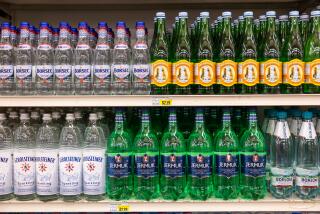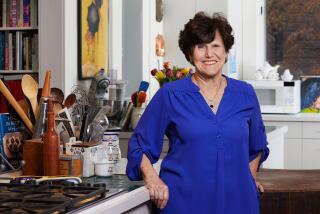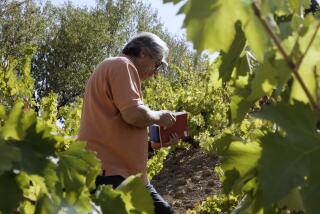Across the Table: Kosher wine worth passing around
How did Jeff Morgan morph from a nice Jewish boy from New York into a sax player and bandleader in sequined tuxedo, then into one of the leading wine journalists in the United States, and finally into a kosher wine maker in the Napa Valley? And one who makes not just any kosher wines but a Cabernet Sauvignon that garners big points and can easily hold its own against the big boys’ Napa Valley Cabs?
It’s a long story filled with digressions.
As a young musician, Morgan went to France to study flute, then got a job as sax player and eventually bandleader at the Grand Casinoin Monte Carlo, developing a love of food and wine. That led to his decision to become a winemaker. But nobody in France, it seems, was interested in hiring an American sax player with zero winemaking experience. “So I moved back to the land of opportunity and found a job at a winery on Long Island, basically as a wine slave, doing vineyard and cellar work, learning the ropes and playing gigs at night.”
After several years of this, he thought it might be easier to write about wine than make it, so he started at a local newspaper and eventually worked his way into the New York Times and a job as the West Coast editor of Wine Spectator magazine.
His first assignment in 1992? To write a story on kosher wine for Passover. “My response was, why me?” I didn’t know a thing about kosher wine. I hadn’t even been bar mitzvahed” he recounts. “But I took the job.” In the process, Morgan learned that among the many questionable kosher wines available 21 years ago, there actually were some really good ones.
He wrote that story almost every year for the next seven. “I learned that kosher wine could be made exactly the way non-kosher wine is made. There is no kosher technique. What matters is who touches the wine.” And also that all of the ingredients, including any fining agents, need to be kosher.
Flash forward to 1999, when Leslie Rudd of Rudd Vineyards hired Morgan as wine director at Dean & DeLuca in Napa Valley. The two became friendly. At the same time Morgan started a small (non-kosher) rosé project called SoloRosa. Rudd organized a Jewish winemaker tasting group that invited an Israeli kosher wine maker to present his wine.
“It was a Bordeaux blend — and delicious, so much better than either of us had grown up drinking at Passover,” remembers Morgan. “Those wines were lousy because they were made with the Concord grape.”
The light bulb went on. Morgan told Rudd that if he gave him 10 tons of his best grapes, they could make the greatest kosher wine in 5,000 years. “It was a moment of chutzpah.”
Rudd’s response was, “Are you crazy? What if you screw it up? It will be the worst kosher wine in 5,000 years — and from Rudd Vineyard!” That was that — until Rudd came back with an offer: If Morgan found some other grapes, he’d be his partner.
They decided to call the wine Covenant.
Next step: Morgan had to find Sabbath-observant Jews for his cellar crew. The only ones who knew how to make fine wine were at Herzog Cellars in Southern California, so he persuaded Nathan Herzog to help him out, and in exchange, Herzog could distribute the wines in New York and New Jersey.
For the first harvest in 2003, Morgan brought the grapes down to Herzog in a refrigerated truck. “We used my grapes, my winemaking protocol — and the Herzog cellar crew’s hands,” Morgan says.
The wine got great reviews when it was released in 2005: 93 points from Robert Parker and 92 points from Wine Spectator.
“I did a little celebratory dance. It was nice to know that we made a kosher wine that got serious recognition by the media,” says Morgan, adding that they weren’t the first and only kosher wines ever to get good scores. However, Covenant consistently gets 90-plus scores from the major publications that rate wine.
In 2008, he was able to move the Covenant operation up to Napa, because Jonathan Hadju, one of Herzog’s cellar crew, had moved to the Bay Area. “I asked him to be my associate winemaker. Though I had my bar mitzvah at 54, if Iwant to taste the wine or pull wine out of the barrel, Jonathan has to do that,” says Morgan. “Unfortunately, there’s a lot of cleanup I can still do.”
Covenant wines, which range from $24 to $150 per bottle, are available from its website, https://www.covenantwines.com, or by phone (707) 963-7385. In Los Angeles, Cask Wine Shop at 8616 Pico Blvd. has an excellent selection of kosher wines.
More to Read
Eat your way across L.A.
Get our weekly Tasting Notes newsletter for reviews, news and more.
You may occasionally receive promotional content from the Los Angeles Times.










